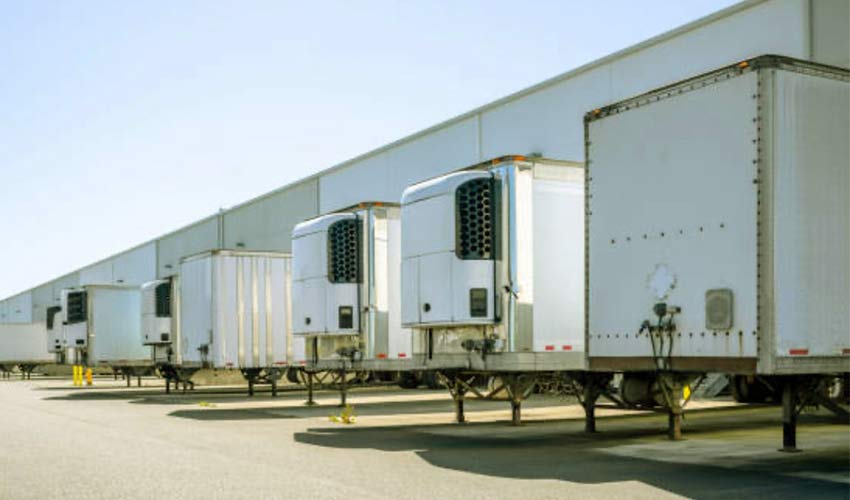Optimize your savings on shipping refrigerated goods by evaluating multiple carriers offering refrigerated services and accessing instant pricing results.
What is meant by Refrigerated Freight?
Refrigerated cargo pertains to goods that necessitate precise temperature-controlled conditions throughout transportation. This is where the role of refrigerated trucks, also known as reefer trucks, becomes crucial. Just as the name suggests, these trucks are equipped with integrated refrigeration systems within their trailers to maintain the coolness of the cargo. Thus, your freight will reach its destination undamaged and unaffected by spoilage.

Advantages of our refrigerated and temperature-controlled freight services.
1- Day-of pick-up availability
2- Extensive fleet of temperature-controlled machinery
3- Uninterrupted direct shipping
4- Enhanced expedited delivery choices
5- Committed account supervision
6- Shipping of temperature-controlled cargo via 100+ carriers
7- Continuous real-time tracking and tracing, accessible 24/7
8- Ample capacity to accommodate peak periods for seasonal enterprises
9- Coverage for destinations across the United States and Canada
10- Leveraging over a decade of transportation expertise on your behalf!
Exploring the Advantages of Refrigerated Trucks
Refrigerated freight trucks, also referred to as reefer trucks, are specialized vehicles equipped with refrigeration units designed to preserve the temperature of the cargo during transportation. These trucks play a crucial role in the movement of perishable goods like food, pharmaceuticals, and medical supplies. The following are key advantages associated with the use of refrigerated freight trucks:
Preserves product quality: One of the primary benefits of refrigerated freight trucks is their ability to uphold the quality of the transported cargo. By controlling the temperature, these trucks ensure that perishable goods remain fresh, minimizing the risk of spoilage, contamination, or damage. This aspect is particularly important for food items that require specific temperature conditions to maintain their nutritional value and taste.
Prolongs product shelf life: Refrigerated freight trucks are instrumental in extending the shelf life of perishable goods by preserving their freshness and quality for longer periods. Consequently, products can be transported over greater distances, reaching a wider range of markets and presenting increased sales opportunities for manufacturers and distributors.
Ensures regulatory compliance: The transportation of perishable goods is subject to stringent regulations and guidelines aimed at ensuring food safety and preventing the spread of diseases. By utilizing refrigerated freight trucks, businesses can guarantee compliance with these regulations, mitigating the risk of costly fines or legal repercussions.
Cost-effective: Although refrigerated freight trucks entail higher initial costs compared to regular trucks, they prove to be cost-effective in the long run. By maintaining the quality and freshness of the cargo, businesses can reduce the chances of product spoilage, minimizing waste and loss of revenue.
Versatility: Refrigerated freight trucks are not limited to transporting perishable food items alone. They are also suitable for transporting other temperature-sensitive goods, including pharmaceuticals, medical supplies, and electronics. This versatility makes them an ideal choice for businesses involved in the transportation of various products that require a controlled environment.
In conclusion, refrigerated freight trucks are indispensable assets within the supply chain for transporting perishable goods. By preserving the quality and freshness of the cargo, these trucks enable businesses to reduce waste, adhere to regulations, and capitalize on sales opportunities. With their versatility and long-term cost-effectiveness, investing in refrigerated freight trucks can yield substantial benefits for businesses.
The Functioning Mechanism of a Reefer Trailer
A reefer trailer, also referred to as a refrigerated trailer, is specifically designed to transport perishable goods at precise temperatures. These trailers employ an integrated refrigeration system to accomplish this task. Depending on the model, the refrigeration system is powered by either an independent diesel engine or an electric power source.

The refrigeration system within a reefer trailer operates by extracting heat from the interior, thereby lowering the air temperature. This is achieved through the circulation of refrigerant across a series of evaporator coils situated inside the trailer. The refrigerant absorbs heat from the air within the trailer and transfers it to an exterior condenser coil.
To cool the condenser coil, a fan or water is utilized, causing the refrigerant to condense and transition into a liquid state. The liquid refrigerant is then pumped back into the evaporator coils within the trailer, where the cycle repeats. This process maintains the desired temperature within the trailer, which is vital for transporting perishable goods requiring specific temperature control.
Reefer trailers incorporate additional features to uphold the interior temperature, including insulation, air ducts, and temperature sensors. The insulation present in the trailer’s walls, roof, and floor prevents the entry or escape of heat. Air ducts facilitate the circulation of cool air throughout the trailer, ensuring even cooling. Temperature sensors are strategically placed within the trailer to monitor and regulate the temperature, ensuring it remains within the desired range.
When it comes to powering the refrigeration system in a reefer trailer, there are typically two options: a diesel engine or an electric power source. Diesel-powered reefer trailers possess a separate engine mounted at the front, dedicated to powering the refrigeration system. The engine is connected to the refrigeration unit through a drive shaft or hydraulic pump. On the other hand, electric reefer trailers incorporate an electric generator installed on the trailer itself, providing the necessary power to the refrigeration unit.
In summary, a reefer trailer effectively maintains the desired temperature by employing a refrigeration system that extracts heat from the interior. This temperature control system can be powered by either a diesel engine or an electric power source. Additional features such as insulation, air ducts, and temperature sensors are incorporated to ensure consistent temperature maintenance. Reefer trailers play a crucial role in transporting perishable goods, including food and medicine, that necessitate precise temperature control throughout the transportation process.

